- Home
- Nick Carter
Beirut Incident Page 2
Beirut Incident Read online
Page 2
Or else, I could hop down off that bumper and leap into the clear on the left, so I would have a full view of the man. But no matter how I jumped, I would land somewhat off-balance — and the Dutchman would be kneeling or prone, and steady. He had only to move the muzzle of his rifle a matter of inches for a dead-on shot.
If I went the other way, circling the truck and hoping to catch him by surprise from the other side, he would shoot the legs out from under me the moment I moved in that direction.
I took the only other route open to me. Up and over. With the Luger in my right hand, I used the left as a lever and clambered onto the radiator hood, then up to the cab roof, to drop silently to the bed of the truck. With luck, the Dutchman would be fairly low in the sand behind the deflated right wheel, his attention riveted on the space under the truck bed, waiting for a glimpse of me.
There was no shot, no flurry of movement. I had apparently made my move undetected.
I peered through the space between the slats of the high-staked truck bed. Then, slowly, I crept across to the right rear corner of the vehicle.
I took a deep breath and stood up to my full six-feet-four so that I could look down over the top slat of the sideboards, Wilhelmina at the ready.
There he was, spread-eagled at an angle from the wheel, flat in the sand on his belly. His cheek was firm against the stock of the rifle — the classic prone position for marksmanship.
He had no idea I was there, just three feet above him, staring at his back.
Carefully, I raised Wilhelmina to chin height, then extended my arm over the side of the upper slat of the truck. I aimed at the back of the Dutchman's neck.
He remained motionless, waiting for the first sign of movement that he could spot underneath the truck. But I wasn't coming that way. He was as good as dead.
I squeezed Wilhelmina's trigger.
The gun jammed! Goddamned sand!
Instantly, I shifted my weight from my left foot to my right and snapped my arm downward to release Hugo. The stiletto slid neatly into my left hand, its pearl handle hot to the touch.
There was no way Hugo could jam. I grasped the knife by the haft and cocked my arm, holding the stiletto ear-high. I usually prefer a blade-throw but at this distance, with no interval for the standard end-over-end flip, it would be a haft-throw, straight down, three feet, right between the shoulders.
Some sixth sense must have warned the Dutchman. He suddenly rolled over on his back and stared up at me, his AK-47 arcing toward me as his finger began the trigger squeeze.
I snapped my left arm forward and down.
The needle point of the stiletto pierced the Dutchman's staring right eyeball and drove its three-sided razor-sharp blade into his brain.
Death twitched the saboteur's finger, but the shot echoed harmlessly in the desert sand.
For a moment I hung on with both hands to the top slat of the truck, my forehead pressed against the back of my knuckles. My knees suddenly felt very shaky. I'm fine in action, well-trained, never hesitant. But after it's all over, I always get a very shaky, nauseated feeling.
In one way I'm very normal. I don't want to die. And each time there's the flood of relief that I got them and it wasn't the other way around. I took a deep breath and went back to my work. It was just routine now. The job was over.
I retrieved my knife, wiped it clean, and returned it to its forearm sheath. Then I examined the Dutchman. I had hit him in that wild shooting charge down the hill, all right. The bullet had ranged along the right-hand rib cage. He had lost a lot of blood and it roust have been painful, but it was hardly a crippling wound.
It didn't really matter, I thought to myself. What did matter was that he was dead and the job was over.
There was nothing of importance on the Dutchman, but I transferred his wallet to my pocket. The boys in the lab might learn something interesting from it.
Then I turned my attention to what was left of Hamid Raschid. I held my breath while I made a distasteful search of his clothes, but found nothing.
I stood up, fished one of my gold-tipped filter cigarettes out of my bush jacket pocket and lit it, figuring out my next move. Just leave things as they were, I finally decided, inhaling the smoke gratefully despite the parched condition of my mouth and throat, I could send a sadiki crew back to pick up the truck and the two bodies once I returned to Dhahran.
Raschid's red checked kaffryeh caught my eye and I kicked at it with the toe of my shoe, flipping it over in the sand. Something gleamed, and I leaned over to examine it more carefully.
It was a long, thin metal tube, much like the sort of thing that expensive cigars are packed in. I took off the cap and peered at it. Looked like granulated sugar. Wetting the end of my little finger, I tasted the powder. Heroin.
I replaced the cap and balanced the tube in my palm thoughtfully. About eight ounces. It had been, undoubtedly, Raschid's payoff from the Dutchman. Eight ounces of pure heroin could go a long way toward making an emir out of a' beggar in the Middle East. I stuck it in my hip pocket and wondered how many of those tubes the Arab had received in the past. I'd send it back to AXE. They could do what they wanted with it.
I found Raschid's canteen in the front seat of the truck and drank it dry before tossing it aside. Then I climbed into the Jeep and headed back down the highway to Dhahran.
* * *
Dhahran hung low on the horizon, a dark green silhouette about eight miles down the road. I pressed harder on the accelerator. Dhahran meant cold showers, clean clothes, a tall, cool brandy and soda.
I licked dry lips with a parched tongue. A day or two more to get my reports in order and I'd be out of this hellhole. Back to the States. The fastest route would be by way of Cairo, Casablanca, the Azores, and finally, Washington.
Not one of those cities would rank with the garden spots of the world, but I had plenty of time coming to me if David Hawk didn't have an assignment ready and waiting. He usually did, but if I took my vacation in bits and pieces all along the route home, there wouldn't be much he could do about it. I just had to make sure I didn't accept any telegrams or cables along the way.
In any case, I thought, there's no point taking the dry-throat non-fun route. I'd go home the other way, by way of Karachi, New Delhi, and Bangkok. After Bangkok, what? I shrugged mentally. Kyoto, probably, since I have never cared much for the smog and clamor of Tokyo. Then Kauai, the Garden Island of Hawaii, San Francisco, New Orleans and finally, Washington, and an undoubtedly furious Hawk.
Before all that, of course, there was still tonight — and probably tomorrow night — in Dhahran. Muscles tightened involuntarily, and I grinned to myself.
* * *
I'd met Betty Emers just a week ago, her first night in Dhahran after having been in the States on a three-month vacation. She had come into the club at about nine o'clock one night, one of those women with such a sexual aura that somehow, in that special, subtle way, communicated the message to every man at the bar. Almost in unison every head in the place turned to see who had come in. Even women looked at her, she had that kind of presence.
I'd been attracted to her at once, and she hadn't sat alone at her table more than five minutes before I walked over and introduced myself.
She'd scanned her dark eyes over me for a brief second before she returned the introduction and invited me to join her. We'd had a drink together and talked. I learned that Betty Emers was an employee of one of the American-owned oil companies — and I learned that her life in Dhahran had lacked an important element: a man. As the evening progressed and I found myself becoming more drawn to her, I knew that that would soon be remedied.
Our evening ended with a night of furious lovemaking in her small apartment, our bodies unable to get enough of each other. Her deeply tanned skin was as soft as velvet to the touch, and after we'd spent ourselves, we'd lain quietly, my hand gently caressing every inch of that wonderfully smooth skin.
When I had to leave the next day, I did so with re
luctance, showering and dressing slowly. Betty had wrapped a wispy robe about her, and her farewell had been a hoarse, "See you again, Nick." It had not been a question.
I thought now of her perfect body, the flashing eyes, her short black hair, and I felt her full lips under mine when Td taken her in my arms, crushing her to me as we lingered long and deep over a farewell that promised more delights to come…
Now, driving down the Ras Tanura road in a hot, dusty Jeep, I was sweaty again. But it wasn't the same. I grinned to myself as I drove through the Dhahran compound gate. It soon would be.
I stopped at the security office and left word with Dave French, SAMOCO's chief security officer, where to pick up Raschid and the Dutchman. I brushed off his congratulations and desire for details. "I'll give it all to you later, Dave, right now I want a drink and a bath, in that order."
What I really wanted, I told myself as I climbed back into the Jeep, was a drink, a bath, and Betty Emers. I had been too busy with Hamid Raschid and his gang to have spent more than a few phone calls with Betty since that first night. I had a little catching up to do.
I halted the jeep outside my Quonset hut and clambered out. Something was wrong.
As I reached for the doorknob I could hear the strains of Bunny Berrigan's "I Can't Get Started" coming through the door. That was my record, all right, but I certainly hadn't left it playing when I went out that morning.
I pushed open the door, furious. Personal privacy was the only surcease from the steaming cauldron of Saudi Arabia and I was damned if I would see it violated. If it was one of the sadikis, I told myself, I'd have his hide, but good.
With one motion, I threw open the door and stormed in.
Lounging comfortably on my bed, a tall, glistening drink in one hand and a half-smoked cheap cigar in the other was David Hawk, my boss from AXE.
Chapter 2
"Good afternoon, Nick," Hawk said calmly, his grim-visaged New England countenance as close to a smile as he ever allowed. He swung his legs around and came to a sitting position on the side of die bed.
"What on earth are you doing here?" I stood in front of him, towering over the small, gray-haired man, my legs spread defiantly, arms akimbo. Forget Karachi. Forget Delhi. Forget Bangkok, Kyoto, Kauai. David Hawk wasn't there to send me off on vacation.
"Nick," be admonished quietly. "I don't like to see you lose control of yourself."
"Sorry, sir. A temporary lapse — the sun." I was still seething, but contrite. He was David Hawk, a legendary figure in counter-espionage, and he was my boss. And he was right. In my business, there is no place for a man who loses emotional control. You either retain your control at all times, or you die. It's as simple as that.
He nodded amiably, the foul smelling cigar firmly clamped between his teeth. "I know, I know." He leaned forward to peer at me, squinting slightly. "You look awful," he observed. "I gather you've finished the SAMOCO thing."
There was no way he could have known, but somehow he did. The Old Man was like that. I strode over and stooped to examine myself in the mirror.
I looked like the sandman. My hair, usually jet black with just a few flecks of gray, was matted with sand, and so were my eyebrows. The left side of my face was a stinging pattern of scratches, as if someone had worked me over with coarse sandpaper, caked with a dried mixture of blood and sand. I hadn't even realized I'd been bleeding. I must have scraped myself worse than I'd thought scrabbling up the sand dune. For the first time, also, I realized my hands were tender from pressing them against the hot metal of the truck out in the desert.
Ignoring Hawk, I threw off my bush jacket and slipped out of the holsters that held Wilhelmina and Hugo. Wilhelmina would need a thorough cleaning, I thought to myself. I quickly got rid of my shoes and socks and then stepped out of my khaki pants and shorts, all in one motion.
I headed for the shower in the back of the Quonset hut, the sharp coolness of the air conditioner icy on my skin.
"Well," Hawk commented, "you're still in good physical shape, Nick."
Complimentary words from Hawk were really rare. I tightened my stomach muscles and surreptitiously stole a glance downward at my bulging biceps and triceps. There was a puckered reddish-purple depression on my right shoulder, an old gunshot wound. A long, ugly welt ran diagonally across my chest, the result of a knife fight in Hong Kong years ago. But I could still press over six hundred pounds, and my records back at AXE Headquarters still carried "Top Expert" classifications in marksmanship, karate, skiing, horsemanship, and swimming.
I spent a full half-hour in the shower, soaping, rinsing, and just letting the icy spikes of water blast the grime off my skin. After I had toweled myself vigorously, I donned a pair of khaki shorts and rejoined Hawk.
He was still puffing away. There might have been a hint of humor in his eyes, but there was none in the coldness of his voice.
"Feel better now?" he asked.
"I sure do!" I filled a snifter to the halfway mark with Courvoisier, added a single cube of ice and the barest splash of soda. "All right," I said resignedly, "What's up?"
David Hawk took his cigar from his mouth and squeezed it between his fingers, staring at the smoke curling up from the ash. "The President of the United States," he said.
"The President!" I had a right to be surprised. The President almost always kept out of AXE affairs. Although our operation was one of the most sensitive in the government, and certainly one of the most vital, it also often overstepped the bounds of morality and legality that any government must, at least on the surface, espouse. I'm sure the President was aware of what AXE did and, to some small degree at least, aware of how we did it. And I'm sure he was appreciative of our results. But I knew, too, that he'd rather pretend we didn't exist.
Hawk nodded his crew-cut head. He knew what I was thinking. "Yes," he said, "the President. He has a special assignment for AXE and I'd like you to handle it."
Hawk's unblinking eyes pinned me to my chair. "You'll have to start right away… tonight."
I shrugged my shoulders in resignation and sighed. Goodbye, Betty Emers! But I was flattered I'd been chosen. "What does the President want?"
David Hawk permitted himself the ghost of a smile. "It's sort of a lend-lease deal. You'll be working with the FBI."
The FBI! Not that the FBI isn't good. But it's not in the same league with AXE or some of the counter-espionage organizations in other countries that we have to contend with. Like the Ah Fu in Red China for instance, or the N.OJ. of South Africa.
To my mind, the FBI was an effective, dedicated group of amateurs.
Hawk read the thoughts in my expression and held up a palm. "Easy, Nick, easy. This is important. Very important, and the President asked for you himself."
I was dumbfounded.
Hawk continued. "He heard about you from the Haitian affair, I know, and probably from a couple of other assignments. Anyway, he asked for you specifically."
I rose to my feet and took a few quick turns up and down the short length of what served as my living room. Impressive. Few men in my business are personally selected at the Presidential level.
I turned to Hawk, trying not to show my prideful pleasure. "Okay. Would you fill in the details?"
Hawk sucked on his cigar, which had gone out, then looked at it in surprise. No cigar, of course, should dare go out when David Hawk was smoking it. He looked at it in disgust and scowled. When he was good and ready, he began explaining.
"As you probably know," he said, "the Mafia these days is no longer a ragtag collection of Sicilian hoods running bootleg whiskey and bankrolling floating crap games."
I nodded.
"In recent years — beginning, say, about twenty years ago — the Mafia began moving more and more into legitimate business. They did very well, naturally. They had the money, they had the organization, they had a ruthlessness that American business had never dreamed of before."
I shrugged. "So? This is all common knowledge."
&n
bsp; Hawk ignored me. "Now, however, they're in trouble. They've expanded so far, and diversified so much, that they're losing their cohesiveness. More and more of their young men are going into legitimate enterprise, and the Mafia — or the Syndicate, as they call themselves now — is losing control over them. They still have the money, of course, but their organization is breaking down and they're in trouble."
"Trouble? The last report I read said organized crime was at its peak in America, that it had never done as well"
Hawk nodded. "Their income is up. Their influence is up. But their organization is breaking down. When you're speaking of organized crime now, you're not just talking about the Mafia. You're also talking about blacks, Puerto Ricans, Chicanos out west, and Cubans in Florida. Everybody is getting into the act.
"You see, we've been aware of this trend for quite a long time now, but so has the Mafia Commission." He permitted another pale smile to soften his weathered features. "You do know what the Commission is, I presume?"
I gritted my teeth. The Old Man can be so goddamned infuriating when he takes that patronizing air. "Of course I know!" I said, my irritation at his method of explaining this assignment obvious in my voice. I knew very well what the Commission was. Seven of the most powerful Mafia capos in the United States, each the head of one of the major families, named by their peers to serve as a governing board, the court of final appeal, Sicilian style. They didn't meet often, only when a major crisis threatened, but their decisions, carefully considered, absolutely pragmatic, were inviolable.
The Commission was one of the strongest ruling bodies in the world, when you took into consideration its effect on crime, violence and, perhaps most importantly, big business. I scanned my memory bank. Bits and pieces of information were beginning to click into place now.

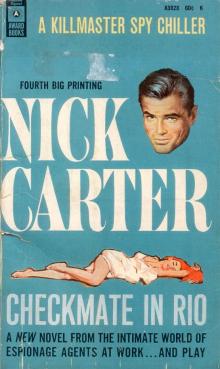 Checkmate in Rio
Checkmate in Rio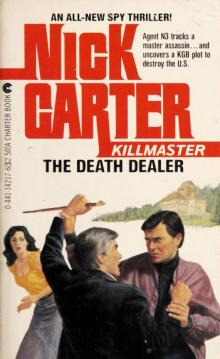 The Death Dealer
The Death Dealer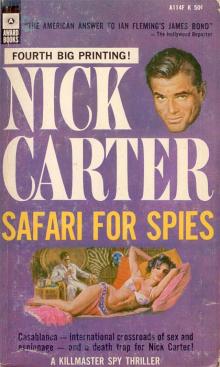 Safari for Spies
Safari for Spies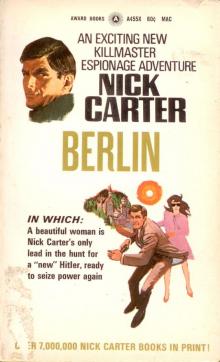 Berlin
Berlin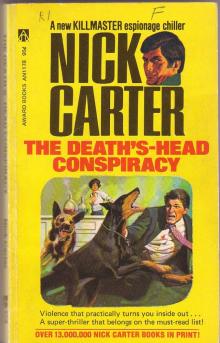 The Death’s Head Conspiracy
The Death’s Head Conspiracy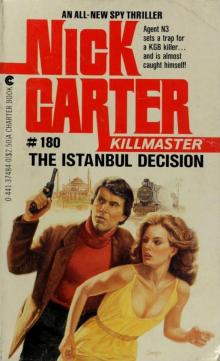 The Istanbul Decision
The Istanbul Decision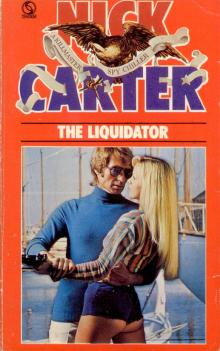 The Liquidator
The Liquidator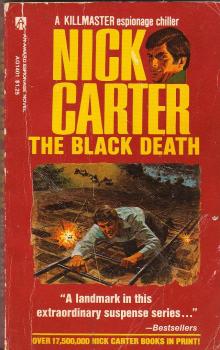 The Black Death
The Black Death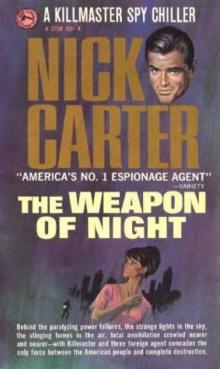 The Weapon of Night
The Weapon of Night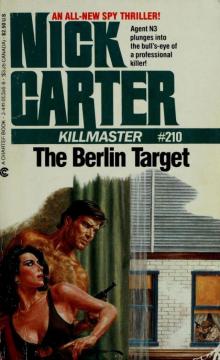 The Berlin Target
The Berlin Target Temple of Fear
Temple of Fear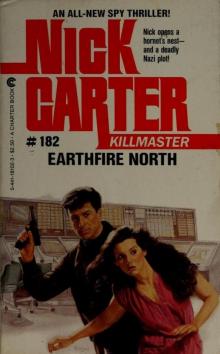 Earthfire North
Earthfire North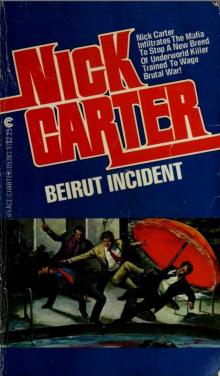 Beirut Incident
Beirut Incident White Death
White Death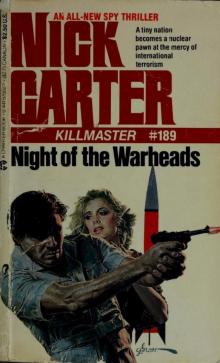 Night of the Warheads
Night of the Warheads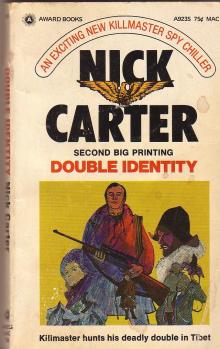 Double Identity
Double Identity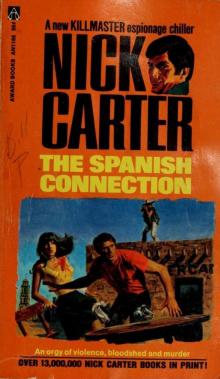 The Spanish Connection
The Spanish Connection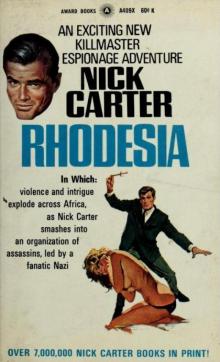 Rhodesia
Rhodesia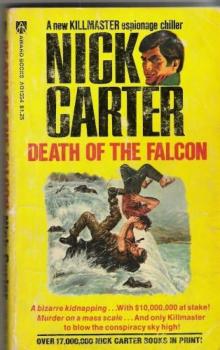 Death of the Falcon
Death of the Falcon The Executioners
The Executioners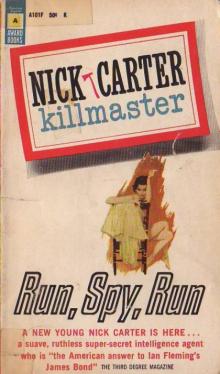 Run, Spy, Run
Run, Spy, Run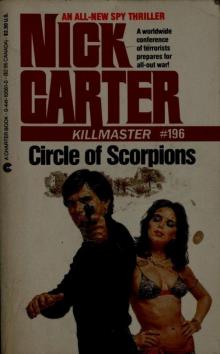 Circle of Scorpions
Circle of Scorpions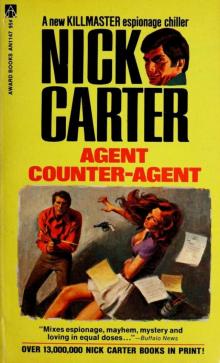 Agent Counter-Agent
Agent Counter-Agent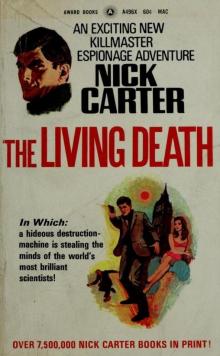 The Living Death
The Living Death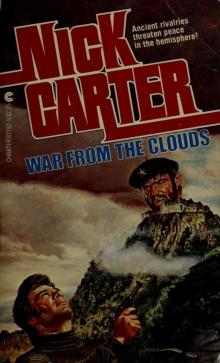 War From The Clouds
War From The Clouds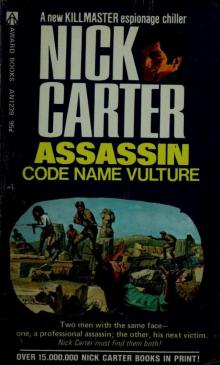 Assassin: Code Name Vulture
Assassin: Code Name Vulture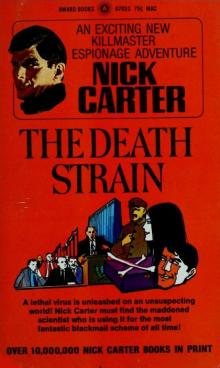 The Death Strain
The Death Strain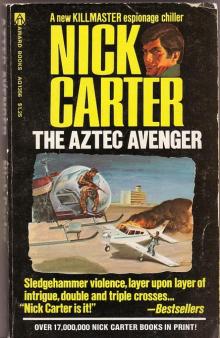 The Aztec Avenger
The Aztec Avenger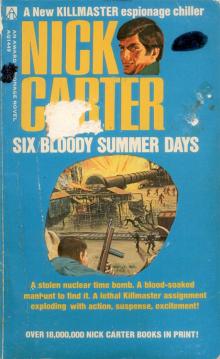 Six Bloody Summer Days
Six Bloody Summer Days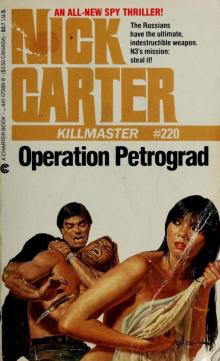 Operation Petrograd
Operation Petrograd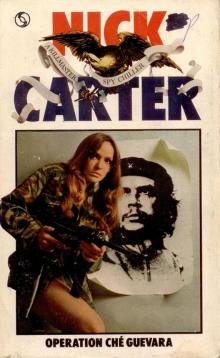 Operation Che Guevara
Operation Che Guevara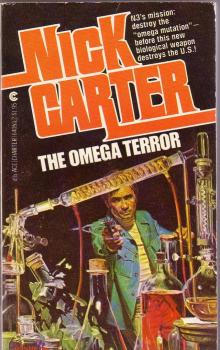 The Omega Terror
The Omega Terror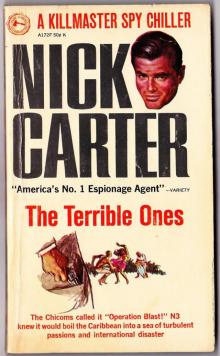 The Terrible Ones
The Terrible Ones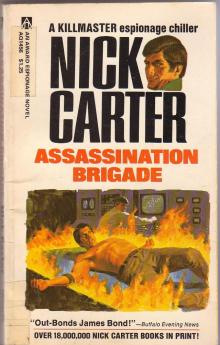 Assassination Brigade
Assassination Brigade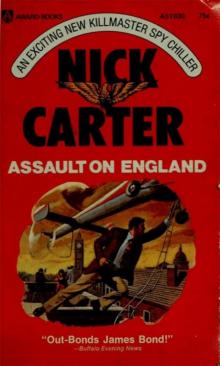 Assault on England
Assault on England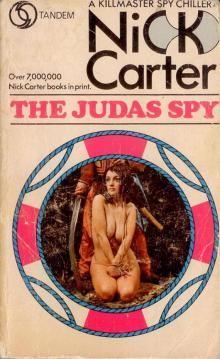 The Judas Spy
The Judas Spy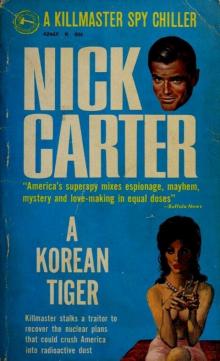 A Korean Tiger
A Korean Tiger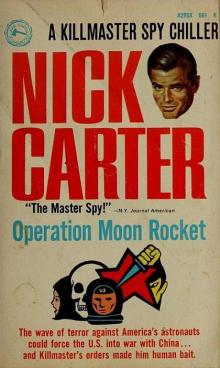 Operation Moon Rocket
Operation Moon Rocket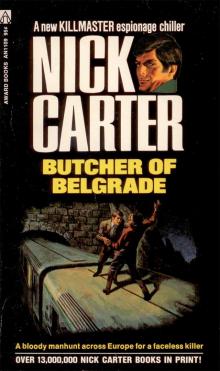 Butcher of Belgrade
Butcher of Belgrade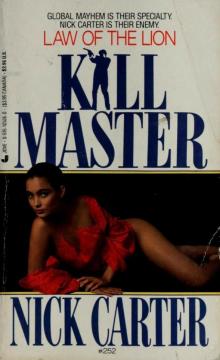 Law of the Lion
Law of the Lion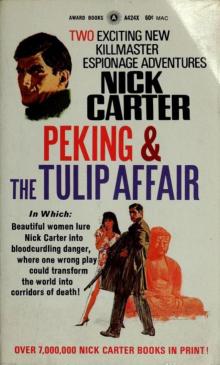 Peking & The Tulip Affair
Peking & The Tulip Affair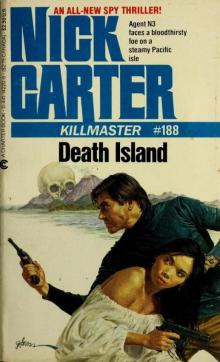 Death Island
Death Island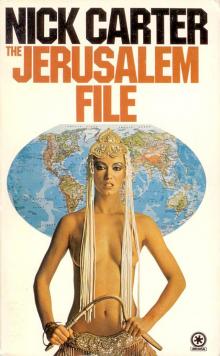 The Jerusalem File
The Jerusalem File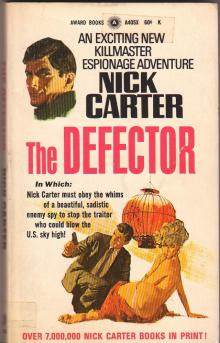 The Defector
The Defector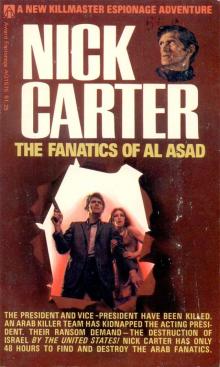 The Fanatics of Al Asad
The Fanatics of Al Asad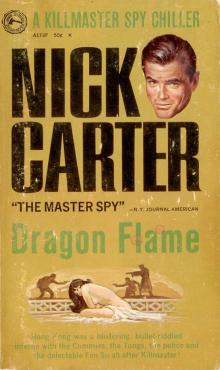 Dragon Flame
Dragon Flame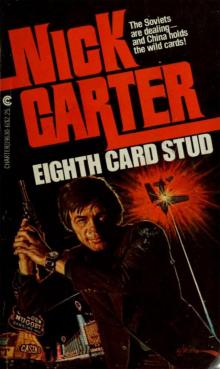 Eighth Card Stud
Eighth Card Stud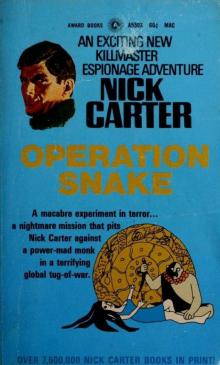 Operation Snake
Operation Snake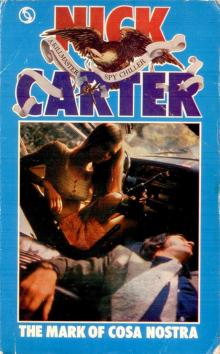 The Mark of Cosa Nostra
The Mark of Cosa Nostra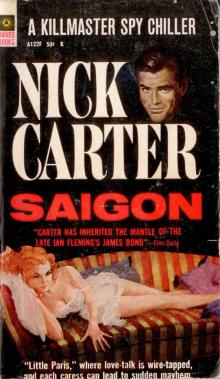 Saigon
Saigon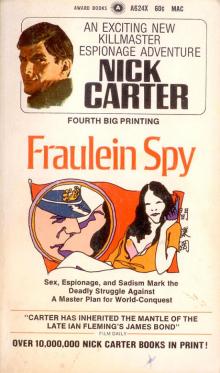 Fraulein Spy
Fraulein Spy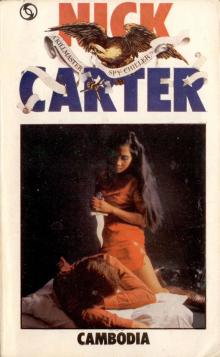 Cambodia
Cambodia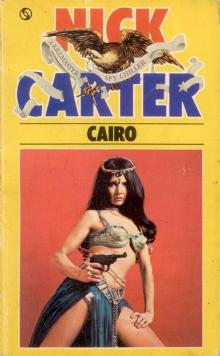 Cairo
Cairo